Plastics have become essential for modern societies but they pose significant dangers to the environment. JUST PROJECT uses discarded plastics and other trash toeveryday s. The design brand engages in intensive research to fulfill its mission to transform trash from a nuisance into something useful.
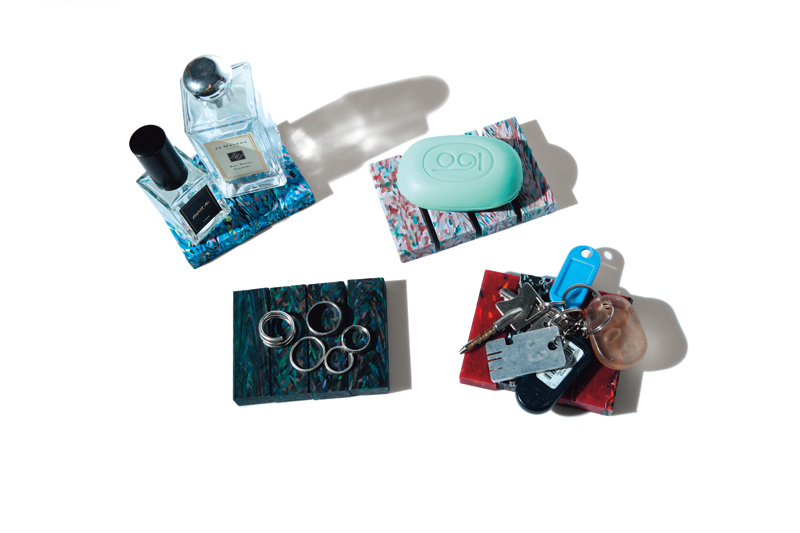
Four-piece block sets made from 100% recycled plastics. The blocks can be used as trays, coasters, or decorative magnets.
ⓒ JUST PROJECT
In capitalist systems, which presuppose constant economic growth, the production, distribution, consumption, and disposal of goods take place ad infinitum. This has led to excessive consumer patterns and, in turn, increased carbon emissions, a major driver of climate change.
AN ETHICAL PERSPECTIVE
Ethical consumerism is one of the keys to achieving carbon neutrality. In their 2002 book, Cradle to Cradle: Remaking the Way We Make Things, U.S. architect William McDonough and German chemist Michael Braungart highlighted the importance of upcycling and promoted the notion of applying the ecosystem’s circulation to product design in order to address the issue of industrial waste. Critical to their idea is the construction of a system that allows useful materials that have yet to reach the end of their life cycle to be reused in the creation of new products.
To reduce the consumption of resources, it is essential that consumers also take ethical considerations into account, for instance, by paying keen attention to brands like JUST PROJECT.
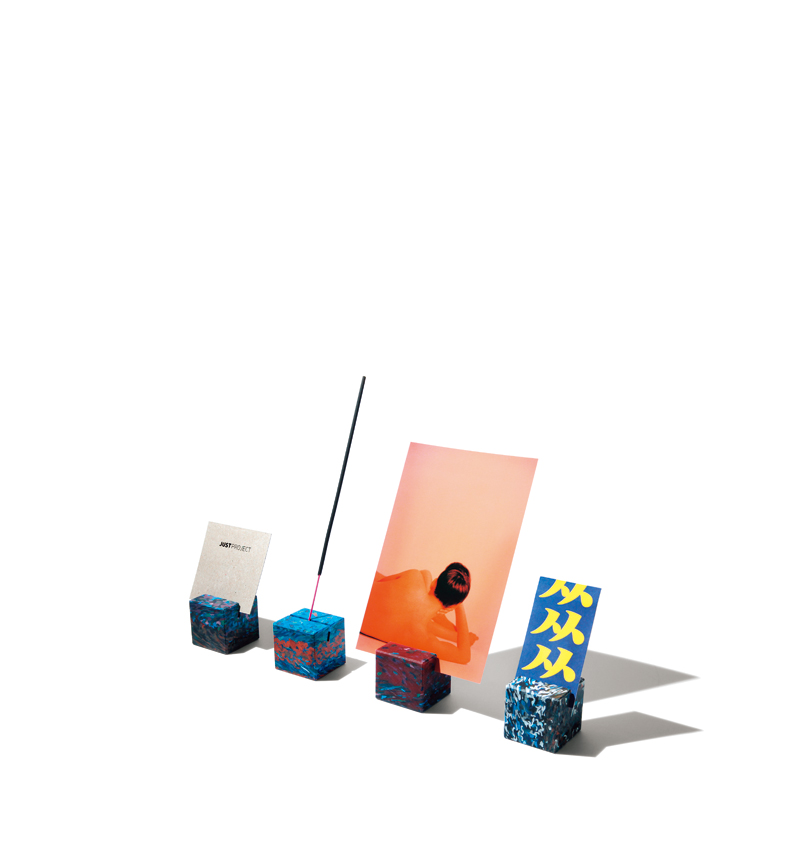
Cubes made from 100% recycled plastics. The groove in the middle can hold things like business cards, photos, or incense sticks.
ⓒ JUST PROJECT
RETHINKING TRASH
“Reduce, reuse, recycle,” or the three R’s, is one of the maxims of ethical consumerism. In the pursuit of carbon neutrality and the effective circulation of resources, it is crucial to apply this principle actively and continuously. In recent years, different people have added a fourth R, for instance, for “replant” (trees), “refuse” (straws and plastic bags), or “rethink.”
JUST PROJECT is a 12-year-old company and design brand that consistently communicates a message of sustainability. Its main work involves collecting trash and reusing it tosomething useful. On top of this, the company plans and executes exhibitions, workshops, and events devoted to upcycling. It also publishes a magazine that explores ecosystems conducive to resource circulation. One of the main reasons JUST PROJECT has attracted attention is the direction of the brand’s CEO Yi Young-yeun. Yi does not consider JUST PROJECT an environmental movement but defines it as a design brand that inspires people to rethink their consumer behavior and offers them products they may actually need. Rather than claiming to pursue a grandiose, planet-saving cause, JUST PROJECT places meaning in work that its employees really want to do while making things people really want to have. As the name suggests, JUST PROJECT “just” wants to devote itself to making things.
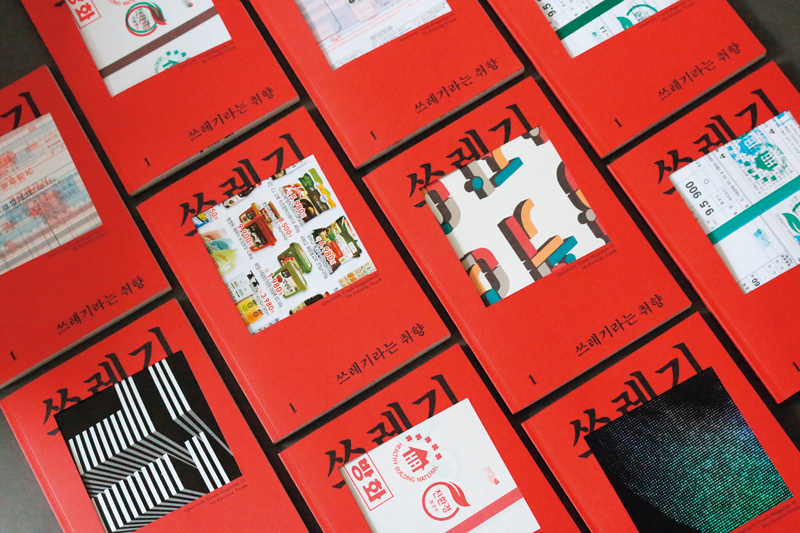
JUST PROJECT’s quarterly magazine Trash introduces the stories and work of individuals who like, collect, and research trash. Each cover is unique as they are made from discarded leaflets or other printed materials.
ⓒ JUST PROJECT
TRANSFORMING TRASH INTO TREASURE
It is interesting to track which waste items JUST PROJECT recycles and transforms into products. New rugs, bags, wallets, and pouches are given names that show their previous use, such as “I was t-shirts,” “I was a label,” “I was foil,” and “I was straw.” Even discarded potato chip packets find a new use. Although they are made from a multied film containing plastic, which makes them difficult to recycle, JUST PROJECT values them for their durable and moisture-proof material. After the foil is spread open and the grease wiped off, they can be used topouches of different sizes. The finished products vary in style depending on the type of chip packet used, making it an enjoyable experience for buyers to pick out their favorites.
JUST PROJECT’s stylish and sturdy rugs are made by cutting up old t-shirts lengthwise, weaving the pieces on a handloom, and adding the finishing touches by sewing them together. Since only cotton shirts are used, the finished rugs are machine washable, and due to the fabric’s different patterns, each rug has a unique design. The use of a handloom, which allows for the fabric to be woven very tightly, results in a beautiful, high-quality product that belies its humble origins.
POSSIBILITIES FOR PLASTICS
Sales are not the only key to JUST PROJECT’s robust growth over the past 12 years. The company has also engaged in a number of collaborative projects with other brands, companies, and philanthropic teams.
For example, as part of the 2023 Seoul Design Festival, JUST PROJECT collaborated on a plastic exhibition with NoPlasticSunday, a brand that strives to build a sustainable circular system for plastic waste. As the exhibition planner, JUST PROJECT recruited furniture and industrial designers active in Korea and had them design furniture using recycled plastic instead of the materials they normally used. The designers produced a range of useful and beautiful pieces of furniture. Their innovative designs led to the exhibition being heralded as proof that recycling plastics offers new functional and aesthetic possibilities, while also reducing sources of environmental pollution.
Another impressive collaboration was the production of a diary with the NGO Team & Team International. In consideration of its entire life cycle, the diary’s cover was made from recycled polyester produced entirely from PET bottles and designed to be reused as a pouch. Profits were used to provide drinking water to people in famine-stricken regions of East Africa, making the project even more meaningful.
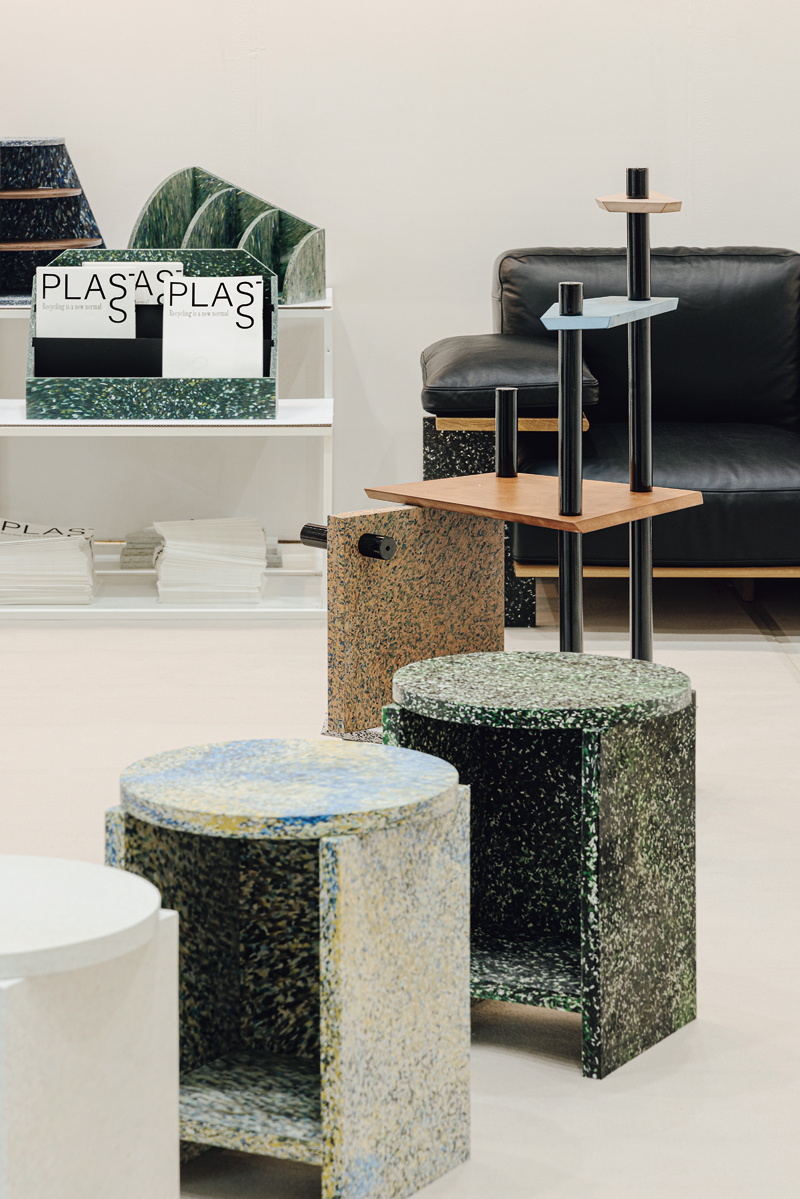
PLASTICS: Recycling Is a New Normal, a collaborative exhibition by JUST PROJECT and NoPlasticSunday at the 2022 Seoul Design Festival, displayed home decor by ten artists.
ⓒ JUST PROJECT
WHAT MAKES A GOOD PRODUCT?
Reducing the enormous amount of everyday waste holds the key to solving the climate crisis. This provides a new perspective on production cycles and consumer behavior. It is now of critical importance that consensus be achieved on the common goal of carbon neutrality. Ideas and experiments must take a product’s entire life cycle into account, from planning, design, and material choice to the moment it is discarded. Over the years, JUST PROJECT has continued to “just” focus on its work while seeking to define the nature of attractive designs and good products. Its methods are striking and persuasively communicate the concepts of recycling and upcycling. At the same time, JUST PROJECT always encourages its customers to rethink what makes a good product.
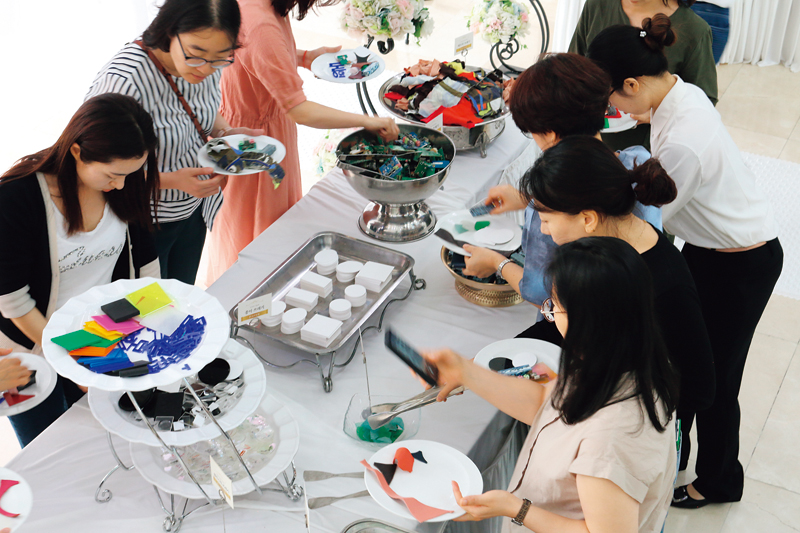
Artist’s Lunch Box: Trash Buffet, held at the Seoul Museum of Art in 2019, allowed visitors to pack a lunch box with pieces of trash collected by JUST PROJECT. An actual lunch was also provided, made with high-quality but unattractive-looking ingredients.
ⓒ JUST PROJECT
Yoo Da-mi Writer